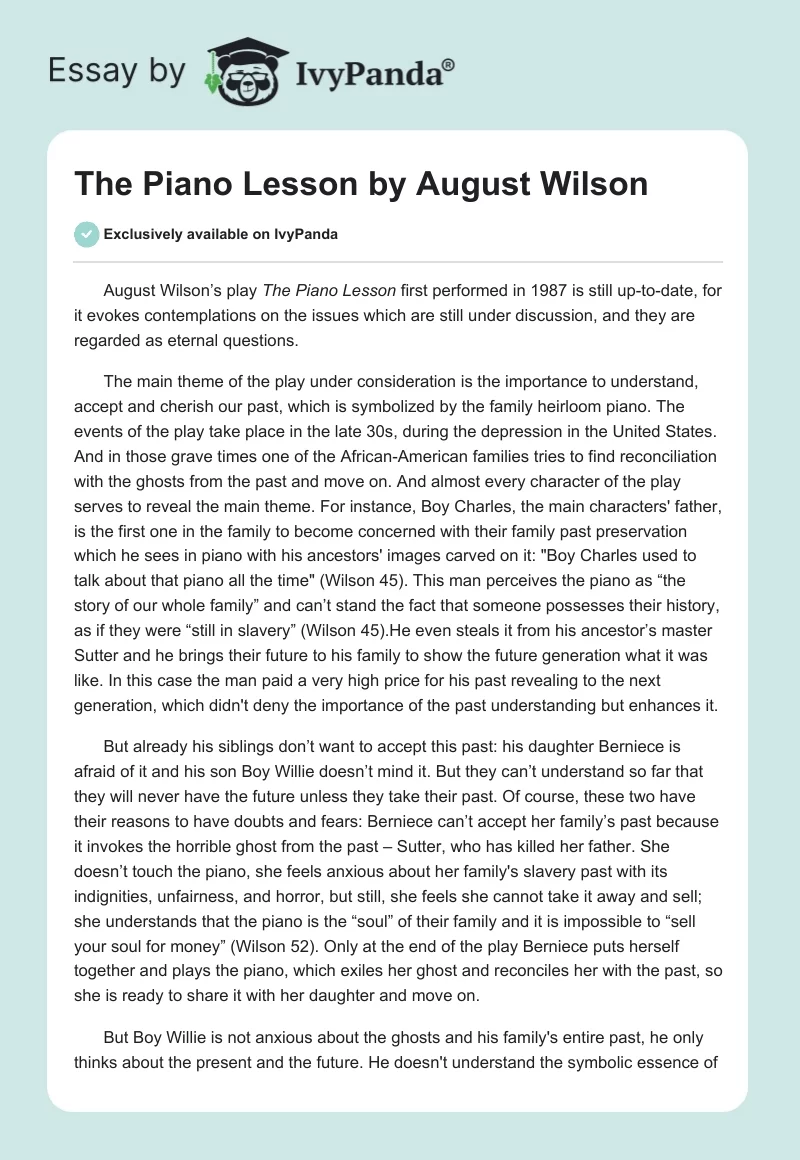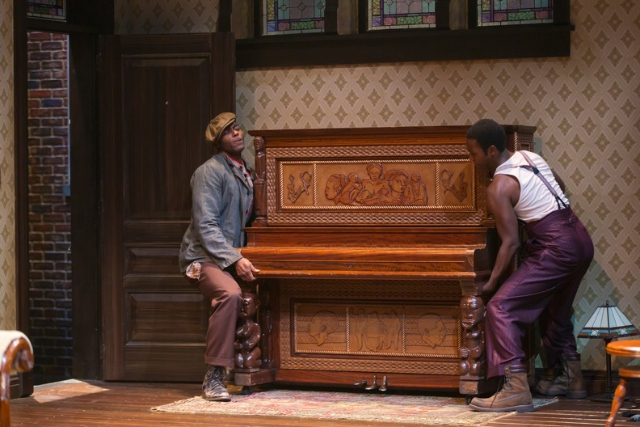Have you ever wondered what it means to be truly free? To escape the shackles of a painful past and embrace a future built on the foundation of hope and resilience? August Wilson’s Pulitzer Prize-winning play, “The Piano Lesson,” delves into these very questions, weaving a powerful tapestry of family, history, and the enduring legacy of African American heritage.

Image: ivypanda.com
Written in 1987, “The Piano Lesson” stands as a poignant testament to the struggles and triumphs of the African American experience in the post-Reconstruction era. The play transports us to the heart of Pittsburgh in 1936, where a family torn by conflicting desires navigates the complexities of their history, their dreams, and their connection to the past. Through the intricate relationships of the characters, Wilson masterfully explores themes of family dynamics, the lingering effects of slavery, the pursuit of freedom, and the transformative power of art.
Unpacking the Conflicts Within: A Family Divided
At the heart of the story lies the Boy Willie, a young, ambitious man desperate to break the cycle of poverty that has plagued his family for generations. He dreams of owning his own land in the South and envisions a future free from the constraints of economic hardship. To achieve this, he has a plan: to sell the family heirloom, a beautifully crafted piano, to raise the necessary funds.
Boy Willie, however, faces fierce opposition from his sister, Berniece, a deeply spiritual woman fiercely attached to the piano. The piano represents more than just an instrument; it embodies the memories of their ancestors, their shared history, and the enduring legacy of their family. For Berniece, selling the piano would be an act of betrayal, a severing of the vital connection to her heritage. The play erupts with tension as the siblings clash over the piano, each convinced their perspective is the only right one, leading to a powerful examination of the complexities of family ties and the weight of tradition.
The Ghosts of the Past: Facing the Scars of Slavery
The play doesn’t shy away from confronting the brutal realities of slavery and the lingering trauma that continues to haunt the African American community. The family’s history is inextricably linked to the institution of slavery, a fact that casts a long shadow over their present realities. The piano itself serves as a tangible link to the past, embodying the stories of struggle, resilience, and the enduring spirit of those who endured unimaginable hardship.
One of the most captivating elements of the play is the introduction of Sutter, a white man who unjustly profited from the enslaved labor of Boy Willie’s ancestors. Sutter’s presence brings the weight of historical injustice into the present, forcing the characters to confront the legacy of slavery and its lasting impact on their lives. The playwright skillfully utilizes Sutter’s character to expose the lingering power structures that perpetuate racial inequity and highlight the ongoing struggle for equality.
The Transcendent Power of Art: Finding Hope in Artistic Expression
Amidst the family’s internal conflicts and the haunting presence of the past, there is a glimmer of hope. Art, in the form of music and storytelling, emerges as a powerful force for healing, reconciliation, and empowerment. Through the haunting melodies flowing from the piano, we see the power of music to transcend the boundaries of language and tap into the depths of human emotions. The piano becomes a symbol of resilience and a testament to the enduring spirit of the African American community.
Furthermore, “The Piano Lesson” itself is a testament to the power of storytelling. Wilson utilizes dramatic irony, poetic language, and evocative imagery to paint a vivid picture of the African American experience. By bringing these stories to life onstage, the play serves as a powerful tool for raising awareness, amplifying voices, and fostering understanding across generations.

Image: amazonia.fiocruz.br
Exploring the Deeper Themes: The Piano Lesson as a Mirror to Society
“The Piano Lesson” transcends the confines of family drama and the historical context of the 1930s. It serves as a potent allegory for the ongoing struggles of racial equality, class inequality, and the search for identity in a world shaped by historical injustices.
Even today, the play’s themes resonate deeply in contemporary society. The fight for equitable treatment, the enduring legacy of systemic racism, and the need for reconciliation are issues that continue to confront us. “The Piano Lesson” serves as a reminder that we cannot ignore the past, but we must also be empowered by the hope for a future built on the foundations of justice and equality.
Finding “The Piano Lesson” by August Wilson: Downloading the PDF
You can experience the raw power of “The Piano Lesson” by August Wilson firsthand by downloading a PDF copy of the play. There are many online resources where you can find this valuable resource. A simple search on Google or Amazon will lead you to websites that offer free or affordable downloads of the play.
By reading the text of the play, you can engage deeply with the characters, their dialogue, and the intricate tapestry of their experiences. You can envision the stage, hear the music, and feel the weight of the historical context woven into every scene.
The Piano Lesson By August Wilson Pdf
Conclusion: A Powerful Legacy for Generations to Come
August Wilson’s “The Piano Lesson” is far more than just a play; it is a powerful testament to the enduring spirit of the African American community. It serves as a window into the past, a reflection on the present, and a beacon of hope for the future. Through its complex characters, poignant dialogue, and timeless themes, “The Piano Lesson” leaves an indelible mark on the reader’s mind, reminding us of the importance of honoring our history, celebrating our heritage, and striving towards a future where equality and justice reign supreme.




